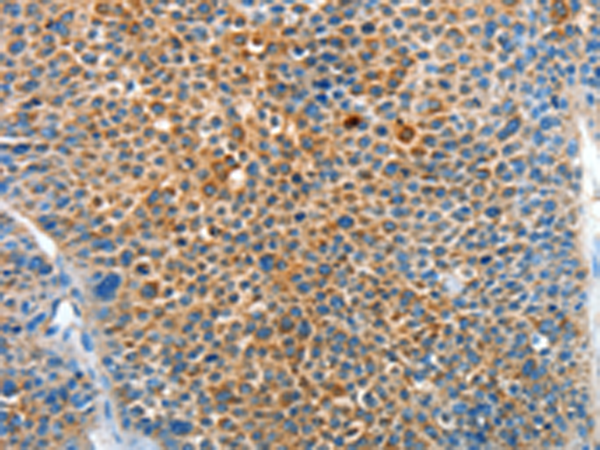

| WB | 咨询技术 | Human,Mouse,Rat |
| IF | 咨询技术 | Human,Mouse,Rat |
| IHC | 1/50-1/200 | Human,Mouse,Rat |
| ICC | 技术咨询 | Human,Mouse,Rat |
| FCM | 咨询技术 | Human,Mouse,Rat |
| Elisa | 1/2000-1/5000 | Human,Mouse,Rat |
| Aliases | AAP; API; PLI; A2AP; ALPHA-2-PI |
| WB Predicted band size | 55 kDa |
| Host/Isotype | Rabbit IgG |
| Antibody Type | Primary antibody |
| Storage | Store at 4°C short term. Aliquot and store at -20°C long term. Avoid freeze/thaw cycles. |
| Species Reactivity | Human |
| Immunogen | Synthetic peptide of human SERPINF2 |
| Formulation | Purified antibody in PBS with 0.05% sodium azide and 50% glycerol. |
+ +
以下是关于SERPINF2(α-2抗纤溶酶)抗体的3篇参考文献概览:
---
1. **标题**:*"Hereditary α-2-antiplasmin deficiency caused by a novel SERPINF2 mutation"*
**作者**:M. Tefs et al.
**摘要**:研究报道了一种新型SERPINF2基因突变导致的遗传性α-2抗纤溶酶缺乏症,通过特异性抗体检测患者血浆中蛋白水平显著降低,揭示其与异常出血表型的关联。
2. **标题**:*"Role of α-2-antiplasmin in hepatocellular carcinoma progression"*
**作者**:K. Suzuki et al.
**摘要**:利用SERPINF2抗体分析肝细胞癌组织样本,发现α-2抗纤溶酶表达上调与肿瘤侵袭性相关,可能通过抑制纤溶酶活性促进癌细胞转移。
3. **标题**:*"Immunohistochemical detection of α-2-antiplasmin in thrombotic disorders"*
**作者**:H.R. Lijnen et al.
**摘要**:开发基于SERPINF2抗体的免疫组化方法,证实α-2抗纤溶酶在静脉血栓患者血管壁中的异常沉积,提示其参与病理性凝血调控。
---
以上文献展示了SERPINF2抗体在遗传病诊断、癌症机制研究和血栓疾病检测中的典型应用。如需具体文章链接或补充信息请告知。
SERPINF2. also known as alpha-2-antiplasmin (A2AP), is a serine protease inhibitor primarily synthesized in the liver and megakaryocytes. It plays a critical role in regulating fibrinolysis by irreversibly inhibiting plasmin, the key enzyme responsible for breaking down blood clots. SERPINF2 binds to plasmin, forming a stable complex that prevents excessive fibrin degradation, thereby maintaining a balance between coagulation and fibrinolysis. Deficiencies in SERPINF2. though rare, are linked to a bleeding disorder characterized by delayed clot lysis and prolonged hemorrhage. Conversely, elevated levels have been associated with thrombotic conditions due to impaired fibrinolysis.
SERPINF2 antibodies are essential tools in biomedical research and diagnostics. They enable the detection and quantification of SERPINF2 in plasma or tissue samples via techniques like ELISA, Western blotting, or immunohistochemistry. These antibodies aid in studying SERPINF2's physiological roles, its interactions with plasmin, and its involvement in pathological conditions such as bleeding disorders, thrombosis, or liver diseases. Commercial SERPINF2 antibodies are typically developed in hosts like rabbits or mice, targeting specific epitopes with validated specificity. Recent studies also explore their therapeutic potential, such as modulating SERPINF2 activity to manage clotting abnormalities. Understanding SERPINF2 dynamics through antibody-based assays continues to advance insights into hemostatic disorders and therapeutic strategies.
×